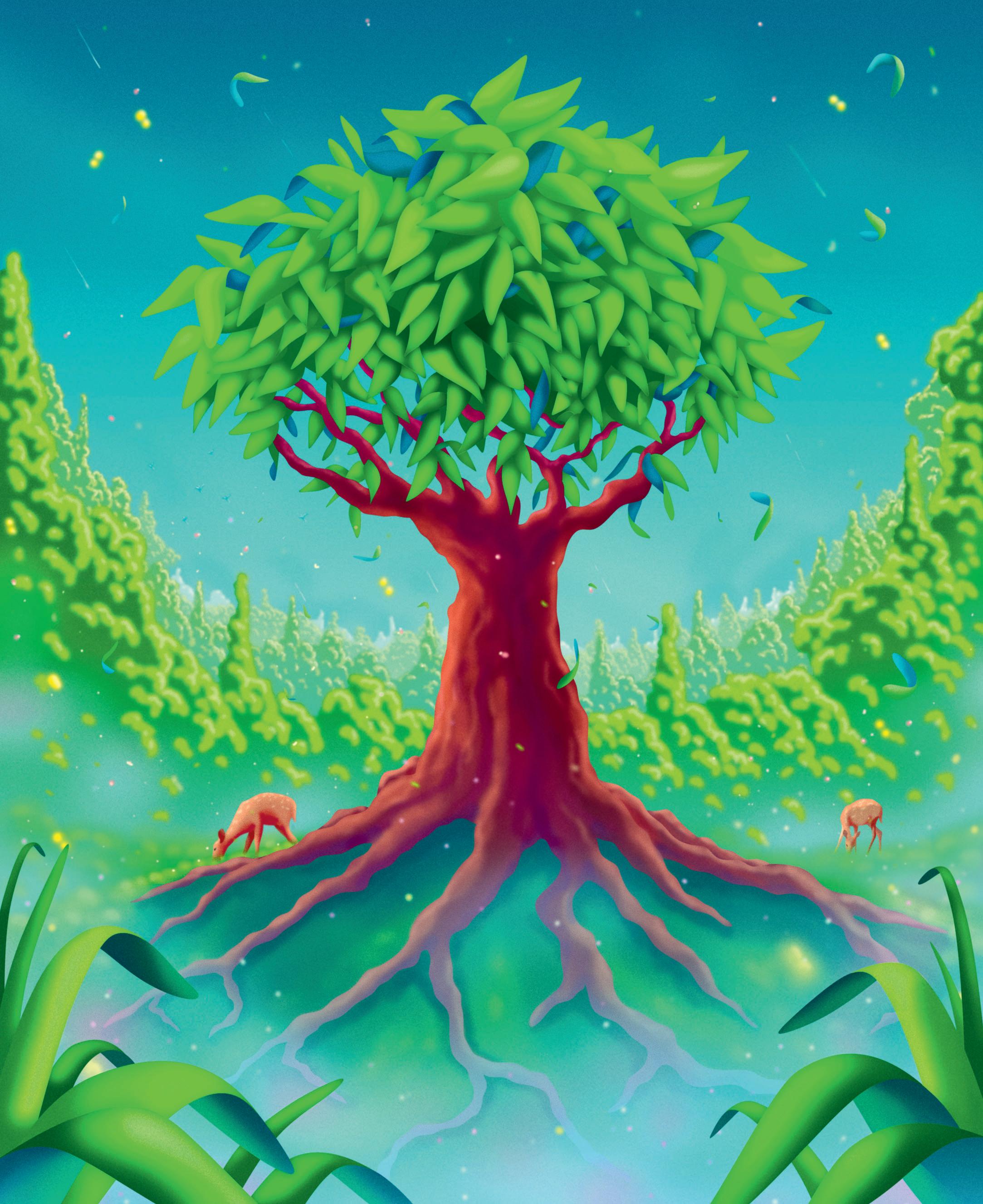Prøve GULL - Gratis
Into the woods
The Guardian Weekly
|May 03, 2024
In the past 10 years the idea that trees communicate with and look after each other-dubbed the 'wood-wide web' - has gained widespread currency. But have these claims outstripped the evidence?

THERE ARE A LOT OF HUMANS. Teeming is perhaps an unkind word, but when 8 billion people cram themselves onto a planet that, three centuries before, held less than a tenth of that number, it seems apt. Eight billion hot-breathed individuals, downloading apps and piling into buses and shoving their plasticky waste into bins - it is a stupefying and occasionally sickening thought.
And yet, humans are not Earth's chief occupants. Trees are. There are 3tn of them, with a collective biomass thousands of times that of humanity. But although they are the preponderant beings on Earth - outnumbering us by nearly 400 to one - they're easy to miss. Show someone a photograph of a forest with a doe peeking out from behind a maple and ask what they see. "A deer," they'll exclaim, as if the green matter occupying most of the frame were mere scenery. "Plant blindness" is the name for this. It describes the many who can distinguish hybrid dog breeds yet cannot identify an apple tree.
Admittedly, trees do not draw our attention. Apart from plopping the occasional fruit upon the head of a pondering physicist, they achieve little that is of narrative interest. They are "sessile" - the botanist's term meaning incapable of locomotion. Books about trees often have a sessile quality, too; they are informative yet aimless affairs, heavy on serenity, light on plot.
Or, at least, they were until recently. The German forester Peter Wohlleben's surprise bestseller, The Hidden Life of Trees (published in English in 2016), has inaugurated a new tree discourse, which sees them not as inert objects but intelligent subjects. Trees have thoughts and desires, Wohlleben writes, and they converse via fungi that connect their roots "like fibre-optic internet cables". The same idea pervades The Overstory, Richard Powers' celebrated 2018 novel, in which a forest scientist upends her field by demonstrating that fungal connections "link trees into gigantic, smart communities".
Denne historien er fra May 03, 2024-utgaven av The Guardian Weekly.
Abonner på Magzter GOLD for å få tilgang til tusenvis av kuraterte premiumhistorier og over 9000 magasiner og aviser.
Allerede abonnent? Logg på
FLERE HISTORIER FRA The Guardian Weekly
The Guardian Weekly
My boyfriend's use of AI stops him thinking for himself
My boyfriend of eight years, who is 44, has ADHD and runs his own business.
2 mins
February 27, 2026

The Guardian Weekly
'Our land lets us all breathe clean oxygen'
The Congo River basin is home to a biodiverse ecosystem-and a relentless trade in timber and charcoal
3 mins
February 27, 2026

The Guardian Weekly
Nations apart: Andrew's UK arrest highlights US passivity on Epstein files
It is a tale of two nations.
2 mins
February 27, 2026

The Guardian Weekly
Under water: Engulfed by storms, but climate denial grows
In the week between Christmas and the New Year, two Spanish men in their early 50s - friends since childhood - went to a restaurant and did not come home.
3 mins
February 27, 2026

The Guardian Weekly
The crown in court
A brief history of royal run-ins with the law
3 mins
February 27, 2026

The Guardian Weekly
Big in Beijing
James Balmont's band, Swim Deep, plays to crowds of hundreds across the UK - but in China, they play to tens of thousands. And they're not the only ones
3 mins
February 27, 2026
The Guardian Weekly
Trump's Board of Peace is serving private interests more than public good
In Gaza, aid still trickles in at levels relief agencies say are far below what is required.
2 mins
February 27, 2026

The Guardian Weekly
Needle drops Weight-loss pills are here - and big pharma stands to gain
Oral tablets could bring obesity treatment into the mainstream, with the sector predicted to be worth $200bn by the end of the decade
6 mins
February 27, 2026

The Guardian Weekly
How Italians gradually warmed to their Winter Olympics
With the atmosphere in Rome subdued as the Winter Olympics unfolded across northern Italy, travelling to the Games was not on Amity Neumeister's radar.
3 mins
February 27, 2026

The Guardian Weekly
Fire and fury
Violence erupts as security forces kill feared cartel boss.
1 min
February 27, 2026
Listen
Translate
Change font size

